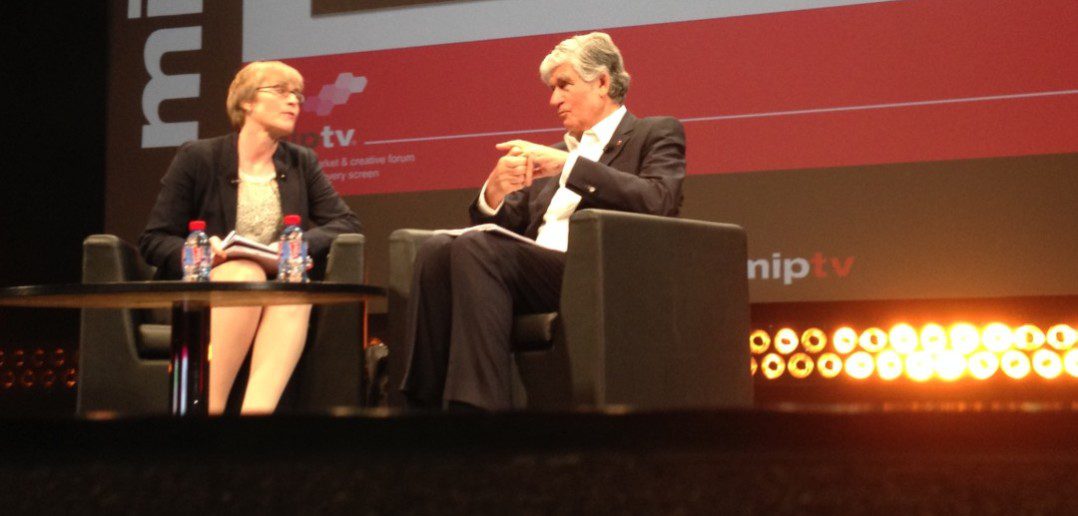Media commentator Kate Bulkley moderated this session with Maurice Levy, chairman and CEO of Publicis, who, among other things, proclaimed his belief in open data, rebuked producers who’ve forgotten their (advertising) roots, and refuted claims that innovation only belongs to the young and nimble. All on the cusp of a $35 billion merger.
« At AdWeek, Sir Martin Sorrell said he felt the biggest threat to the advertising industry was innovative small companies, » said Bulkley. « How do you foster innovation? »
« Innovation and creativity can come from anywhere. I don’t see the small, new startups as a threat, they’re an opportunity, » Levy replied. « They push the envelope, which is important for us because they’re new kids on the block creating something fresh and new. We have to look at this and question ourselves: Are we still in the race? Shall we question the way we work? Maybe it’s a threat for Sir Martin because he feels a bit fatigué! »
Bulkley then asked about how he’s managing the « always-on » mentality: people with screens who want to consume content all the time, wherever they are, whenever they want.
« Online, the communication is more complex, » said Levy. « People love to be connected. They have their smartphones, tablets, they’re always on. Sometimes they don’t remember what screen they watched their movies on. »
But that doesn’t mean there are limits to what advertising can do for them. He nicely illustrated how a recent ad was pure advertising on television, and then was consumed as entertainment online: « Last year we launched a formidable commercial on TF1 one Sunday evening: a 3:30 commercial for Cartier. Then we put it on YouTube: 60 million viewers. I’m always surprised to see what we can do, what we can offer. »
Bulkley then pointed to people’s increasing efforts to avoid advertising. « What are the big bets that you make to reinvent the marketing model so that the audience really wants to be part of it? »
« We know since forever that there’s the possibility to avoid advertising. When you look at people trying to avoid it, you see that it’s a very small number, » said Levy. « TiVO didn’t really help people avoid advertising. Within it was a slice devoted to advertising. »
But he admitted it’s still a challenge. « We need to make advertising interesting. We’re using all our creative tricks to get their attention, to retain it, to deliver the message to the point where we can change their behaviour in favour of the brand. »
Where digital is concerned, targeting and interactivity are crucial.
« Interactivity is the holy grail: we send the message and can get something back. What’s important is to send the right message. Digital is helping us target exactly the right cluster of people we want to address, » he said.
As an example, he used American Express, for which Publicis produces 4000 ads per year in the US. « It’s not because we have many things to sell; it’s because we can target more precisely, by changing a catchline or whatever, with a message more relevant to the group of people, » said Levy.
But not every advertiser is AmEx; « consumer goods is more complicated, » he pointed out. « The costs are low, and fine-tuning isn’t as efficient as it is to just go through TV. But you need both the snipers (who target with great precision) and the broadcasters. »
Steering the conversation toward production and television, Bulkley asked whether, when working with producers and networks, they get upset about Publicis making their content too much like advertising.
« It is presumptuous to say ‘I am the guardian of what’s good and what’s bad taste’. That said, if we have a script we agree upon, we do it together, » Levy replied.
« Some great directors have said ‘I like this’ or ‘I don’t like this’. TV producers come to us with ideas, we or the client decide if we like them, but this is brand content. It has to serve a purpose. »
He went on to say that advertisers aren’t in the same business as TV producers. « They’re trying to get the audience they want, they’re targeting. We’re targeting a specific audience with a specific message. We’re not only storytellers per se; we’re storytellers about a brand, and a message that we’re paid to carry to the audience that we’re targeting. We don’t try to mix the business.
« They’re in show business, we’re in the ad business. We respect what they do, I hope that they respect what we do. I hope so, because a lot of them are coming from our world. It’s where they were trained and educated. It was training paid for by advertisers. »
« What about the selfie trend? » Bulkley asked.
Levy proudly boasted that the two most famous selfies in the world were both Publicis productions, « something we did for Samsung! » he said. « The one with all the actors at the Oscars, and the second with President Obama, both were done by our teams. » Levy even said Ellen DeGeneres’ infamous selfie was worth $1bn in advertising value terms, no less!
In her closing question, Bulkley asked how he feels about big data: who owns it, and how Levy feels about being disintermediated by brands, which are increasingly data owners themselves.
Levy addressed these separate issues one at a time, beginning with disintermediation. « Publicis started in ’71, » he sighed. « And there was always someone, every other year, that would disintermediate the agency. Agencies have never been as strong as they are today. »
He dovetailed into data ownership by stressing, « I’m not trying to be Google. I’m just trying to understand what the brand stands for, what it wants to do, and what kind of message it wants to get from the audience. »
He went on to say, « It’s not about data. Who owns data? I hope everyone owns it », because one–person ownership of all data is terrifying, Levy said, bringing Big Brother to mind.
For Levy, the real question is whether tech platforms will share their data. « They can be custodians of the data; it has to be stored somewhere. But everyone should have access. The real owner is not any platform; it’s you for your data, and me for mine. We should be cautious about giving the power to anyone to own the data, particularly government. They should be the last to own the data. »
With that, she thanked Maurice and commended how long he’s been in the ad business.
« I’ll be in it forever, » Levy promised.




